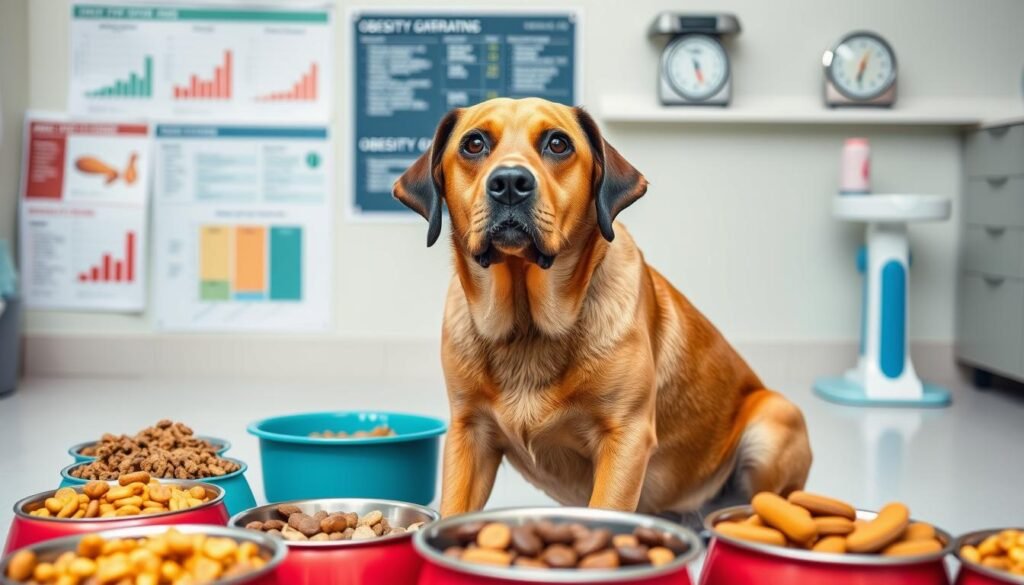How to avoid obesity in Labrador Retrievers
Obesity is a big health problem for Labrador Retrievers. It can hurt their life quality and how long they live. It’s better to stop weight gain before it starts. Labradors tend to gain weight because they love food and have a genetic tendency to do so.
This guide offers many ways to keep Labradors at a healthy weight. It covers diet, exercise, and how much to eat. Knowing the dangers of obesity and taking steps to prevent it is key to keeping these dogs happy and healthy.
Key Takeaways
- Labradors have a genetic predisposition to increased hunger and less efficient calorie burning, making them prone to weight gain.
- The recommended weight range for Labradors is 55 to 80 pounds (24-36 KG in the UK) to maintain good health.
- Treats should make up no more than 10% of a Labrador’s daily food intake to avoid excessive calorie consumption.
- Regular veterinary check-ups are essential to monitor a Lab’s weight and address any underlying health issues contributing to weight gain.
- Gradual increases in exercise, such as walks, playtime, and activities like AKC FIT DOG, can help promote a healthy weight in Labradors.
Understanding Labrador Weight Gain: Genetic Predisposition and Risks
Labradors are known for their friendly and smart nature. But, their genes can make them prone to gaining weight and becoming obese. Studies have found a genetic mutation that affects how they feel hungry and burn calories.
The Genetic Mutation Behind Labrador Hunger
About a quarter of Labrador Retrievers have a genetic mutation in the POMC gene. This gene is key for feeling full after eating. The mutation makes Labradors hungrier and burn fewer calories, raising their risk of gaining weight and becoming obese.
Identifying Healthy Weight Range for Labs
A healthy Labrador should weigh between 55 to 80 pounds (24-36 KG). Labradors with the POMC gene variant are, on average, 1.9kg heavier. Knowing your Lab’s ideal weight is crucial for their health and happiness.
Common Health Risks of Overweight Labradors
Obesity can lead to many health problems in Labradors, such as joint issues, heart disease, diabetes, breathing problems, and cancer. Overweight dogs live 2.5 years less than those at a healthy weight.
Knowing the genetic reasons for Labrador weight gain and the health risks helps you keep your dog healthy and active for a long time.

“Food is often used as a reward during training Labradors, making them more motivated to work for food rewards. The presence of the POMC gene variation makes Labradors more trainable but also more susceptible to obesity.”
How to avoid obesity in Labrador Retrievers
Labrador Retrievers are prone to gaining weight. But, with the right care, you can keep your Labrador healthy. Here are some tips to help:
- Feed an Appropriate Diet: Pick a diet that fits your Labrador’s age and health. Always check with your vet.
- Practice Portion Control: Measure food carefully. Stick to the serving sizes your vet suggests to avoid overfeeding.
- Establish Consistent Mealtimes: Feed your Labrador at the same times every day. This helps them eat regularly.
- Use Interactive Feeding Toys: Use puzzle feeders or toys that make eating a challenge. This slows down eating.
- Increase Daily Activity: Make sure your Labrador gets lots of exercise. This includes walks, playtime, and swimming.
It’s also important to check your Labrador’s body condition regularly. Schedule routine weigh-ins with your veterinarian. This helps spot any weight changes and adjust their diet and exercise.
Choose healthy treats like apple slices, unbuttered popcorn, or banana bits. Treats should not make up more than 10% of their daily food. If needed, consider a prescription weight loss diet from your vet.
“Obesity is the most common preventable disease in dogs, and Labrador Retrievers are very prone to it. Managing their weight is crucial for their health and happiness.”
By following these tips, you can help your Labrador stay at a healthy weight. This avoids the health risks of obesity.

Exercise and Activity Requirements for Weight Management
Labradors are full of energy and need lots of exercise to stay healthy. They need walks, playtime, and fun activities to keep their weight in check. This helps manage their calories and keeps them active.
Begin with several walks a day. Let your Labrador sniff and explore. Give them off-leash time for games like fetching or swimming. Always make sure they are safe.
Try to do at least 30 minutes of exercise daily. Adjust the time and how hard it is based on your Labrador’s age and health. Use puzzle toys and training to keep their mind sharp. You can also use some of their food as rewards during exercise.

